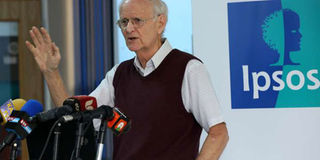Debate focusing on Raila is disturbing

Ipsos Synovate lead researcher Tom Wolf addresses journalists at the company's office in Nairobi on August 2, 2016. PHOTO | JEFF ANGOTE | NATION MEDIA GROUP
What you need to know:
As a person who has come so close but still remains so far from ultimate political power, Cord leader Raila Odinga personifies unresolved grievances about political exclusion, and his supporters see him as more sinned against than sinning.
Jubilee cannot wait to see his back.
There were angry arguments following an opinion poll that Ipsos Synovate released on the approval rating of Cord leader Raila Odinga as a candidate in the 2017 elections.
Cord is aggrieved that Ipsos has unfairly made Odinga’s candidature the subject of opinion polling, something it does not do for his competitors. Cord has alleged that the polling company is working with Jubilee Alliance in order to ruin Odinga’s political future, allegations Ipsos denies, maintaining that Odinga’s candidature in the 2017 elections had been the subject of public interest and a legitimate polling subject.
Public debate around Odinga’s candidature for 2017 has centred on the fact that he has been a presidential candidate thrice before. Since he lost on all those occasions, what makes him think he can win in 2017?
The second argument against his candidature is pegged on Odinga’s age: it is argued that at 71 years, he is too old for public office and should retire, handing over to a younger generation.
At 71 years, Odinga is the same age that Mwai Kibaki was when he took power in 2002, and two years older than US presidential candidate Hillary Clinton, who may become the next US president.
Jomo Kenyatta also became president of Kenya at 72 while Odinga’s own father, Jaramogi, ran for president at 81.
The age of Uganda’s strongman, Yoweri Museveni, is not clear but he is slightly older than Odinga, while at 83, veteran opposition leader in the Democratic Republic of Congo, Etienne Tshisekedi, has his best chance of becoming the country’s president later in the year, after all opposition parties formed a coalition that he leads.
All along, it seemed that the 2017 election was going to be a referendum on the Jubilee Government.
This would only be fair since Jubilee, the coalition in power seeking re-election, should reasonably convince the electorate that it deserves another term in office.
Contrary to the expectation that the next election should be an assessment of Jubilee’s performance, there is emerging an elaborate strategy that seeks to turn the electoral debate on its head and which, oddly, seeks to make Odinga’s personality the subject of the decisions that must be made next year.
As part of this, there has been a clear and deliberate strategy to discredit the Opposition and also Odinga as a person.
Each of the two arguments that Odinga should retire has a problem.
To begin with, the assertion that Odinga has lost in three elections is highly contested, and nearly led to civil war in the country.
MEDIATION PROCESS
The official inquiry on who won the 2007 election failed to determine the winner and the mediation process finally settled on a power sharing arrangement.
It is revisionist and deeply offensive to a large section of the population to assert that Odinga lost all elections he vied in.
The only reason such an assertion is so cavalierly repeated reflects the disproportionate power relations that allow a section of the population to present a select narrative on the 2007 elections, as immutable truth.
The second argument promotes ageism and is surprising.
Why is age an issue in the candidature of Odinga when it has never been a factor in relation to other candidates before him, even when these were roughly his age?
Argumentum ad hominem is Latin for a logical fallacy in which an argument is rebutted by attacking the character, motive, or other trait of the person making the argument, rather than attacking the substance of the argument itself.
The effect of an ad hominem argument is that it shifts attention from the argument and unfairly focuses on the personality making the argument, often over an issue that is not disputed.
In the media, the lead researcher for Ipsos, Tom Wolf, has stated that since 2014, TheStar newspaper and thereafter Ipsos itself, have invested resources in sustaining a public discussion on Odinga’s political future, one that has sustained a level of hostility against him to which no other political leader has been subjected.
This is an ad hominem attack that begs questions about the independence both of the media that they represent and of Ipsos itself.
If Odinga is such a bad candidate and can only lose the next elections, that should surely be what Jubilee wants and should lead to a situation where they prefer him as the Opposition candidate, rather than attacking his suitability to run. It is in Jubilee’s interest that he runs.
First, within the Opposition, Odinga has the greatest gravitas. The possibility of another complaint after the 2017 elections would be minimised if Odinga was not on the ballot.
The second reason is illustrated by reference to Shakespeare’s King Lear, where the deposed king cries to the storming heavens for justice as he is powerless to do anything himself, because he ceded his authority to his treacherous daughters, Goneril and Regan.
He recognises his own folly as a contributor to his problems but adds that he is himself “more sinn’d against than sinning.”
Odinga retains a unique position in Kenyan politics. His continued active participation makes it difficult for Jubilee to consolidate power.
Further, as a person who has come so close but still remains so far from ultimate political power, Odinga personifies unresolved grievances about political exclusion, and his supporters see him as more sinned against than sinning. Jubilee cannot wait to see his back.
In all this, the role of Ipsos and The Star newspaper reeks of partiality and is troubling.




